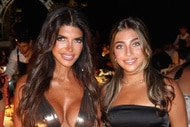
Create a free profile to get unlimited access to exclusive videos, sweepstakes, and more!
Bad News, Seltzer Fans: Fizzy Water Might Make You Eat More, Says Annoying New Study
Is the seltzer boom about to fizzle out?

Let’s take a minute to talk about flavored seltzer. (Or fizzy water or sparkling water or whatever you prefer to call it.) You love it. We love it. LaCroix cult members love it. Seltzer popularity is at an all-time high these days, and it’s not hard to see why. With zero calories, and most brands boasting no artificial sweeteners, sugars or sodium, it seems like a gift from above for anyone trying to kick soda out of their diets. Throw in the fact that companies are crafting seasonal flavors like raspberry rosé and mango berry and it’s clear why seltzer-madness is at its peak.
But now, one new study suggests that seltzer isn’t quite as diet-friendly as it first appears.
According to researchers at Birzeit University in the Palestinian West Bank, carbonated drinks—including sodas and seltzers—were found to increase food consumption in individuals by up to 20 percent compared to those drinking flat, non-carbonated beverages. Which means cracking open that low calorie seltzer might actually be making you hungrier in the long run.
Munchies reports that the research, which was published in the Obesity Research and Clinical Practice Journal, studied the effects that different drinks had on the eating habits of rats over the course of the year. Rats that were given carbonated beverages not only consumed more food than their fellow test rats, but actually “showed signs of chronic obesity, like fat accumulating around organs.”
(Not what we want right before beach season.)
But does that mean we need to kick seltzer to the curb? Maybe—but that could also be a bit of an overreaction. Speaking with The Feast, nutritionist and personal trainer Jenn Menzer tells us that, as with all things health and diet, there’s a lot more to factor in than the results of one study. “I’ve seen the popularity of seltzer rise among my clients as it’s a healthier alternative to soda, and more “exciting” for many than plain water,” she told us, adding, “My initial impression is that one study on rats isn’t enough for me discontinue recommending sparkling water to my clients.”
Menzer expanded on her reasoning, explaining that “water, whether it is carbonated or not, helps to flush waste and toxins from the body and aids in digestion,” which means there could be additional benefits to drinking that bottle of raspberry rosé seltzer, even if it did in fact make you a little hungrier. And being hungrier isn't the end of the world if you're making smart choices—the key, as always, is looking at health and diet in the big picture and making smart decisions for you and your life.
Which, to us, means it's OK to stick with the fizzy stuff.
At least until we test out all those new summer flavors.

























